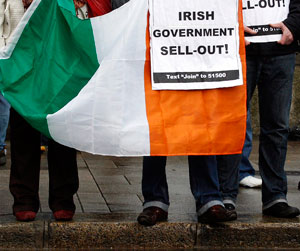Ireland debt crisis: Budget vote remains perilous
The Irish government prepares to publish a 15bn euro plan for drastic savings amid financial crisis. Economics Editor Faisal Islam looks at what is at stake for Ireland’s political class.

This afternoon, the Irish Government will announce a Four Year Plan for reducing the budget deficit, for mending the horrific fiscal damage caused by Ireland’s banks.
It should have been a formality. The boil should have been lanced on Sunday with the application to the giant Euro bazooka for a rescue. Despite the seeming survival of Brian Cowen last night in front of politicians from his own party, today is still rather perilous.
Most of the Dublin bubble have assumed that the main opposition party Fine Gael will, if push comes to shove, fold, and abstain from a Budget vote allowing it to pass. The stakes are that high.
But this is something of a five way Mexican stand-off. The IMF-EU-ECB need tough steps on spending cuts and tax rises to green light the loans. In an ordinary situation the negotiation with a single debtor would be tough enough. But Brian Cowen does not have the mandate to push this through. In the back of the minds of opposition parties must be the notion that the upcoming vote on a Budget will tie their hands for almost all of the next Parliament.
The big political decision will be made in the vote on the Budget. The election will then become a contest to enact these preordained policies. Why do that?
The sensible answer would be a temporary effective government of national unity with a clear mandate for joint negotiations with the troika.
Sensibly the opposition is meeting with the IMF-ECB-EU team. But what is the status of this negotiation? Is Cowen’s plan to implicate the opposition in these unpopular policies before the election? If the opposition know this, why would they cooperate? And how far would the troika go in watering down the harsh plan to keep the opposition on side? At what point would that send perverse incentives to other problem nations to engage in political chaos?
This is classic game theory, and the sensible answer would be a temporary effective government of national unity with a clear mandate for joint negotiations with the troika (and guess what, the creditors have split opinions too). Yet with an election so close the temptation and political rewards for anyone to defect away would be very high.
The background to all of this is profound dissatisfaction with Ireland’s entire political class. The strength of feeling is incredible. I have been stopped repeatedly in Dublin’s streets by apolitical locals who regale me with stories of which bank bondholder deserved to get burnt, and are mutinous about this political failure.
Above all, this is like having the Lib Dem Tory Coalition negotiations, across four different parties, and then getting that Coalition to negotiate with an equally fractious one. And all that to occur before, not after the election. It will take a spectacular act of decisive multi-partisan leadership, of the type engaged by David Cameron the day after the UK election. Anyone in Dublin going to step up to the plate?
Perhaps this extraordinary intervention on bank safety from the world’s biggest bond trader will focus minds. I made a similar point, though in a less incendiary manner in Friday’s blog.
Have your say on the big financial stories of the day on Faisal Islam’s Economics Blog